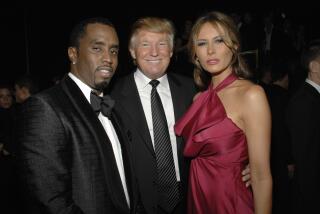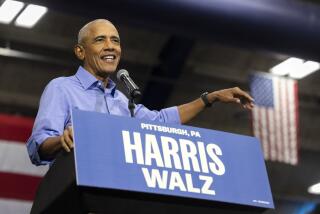President Obama speaks personally on Trayvon Martin and race
- Share via
WASHINGTON — In an extraordinary 19-minute soliloquy, President Obama on Friday spoke bluntly and emotionally about his personal experiences with prejudice, the roots of African American skepticism toward the legal system and his optimism about the future of a nation still fractured along racial lines.
The comments, in a surprise appearance in the White House briefing room, were Obama’s most extensive and personal on race since his election almost five years ago. Obama spoke on the eve of planned national protests over the acquittal of George Zimmerman, who fatally shot Trayvon Martin, an unarmed African American teenager, in 2012.
The president’s remarks followed several days of internal White House discussions about how the first black president should respond to the Florida jury’s decision in the Zimmerman case. The White House released a statement by Obama a day after the verdict, but the president himself had not commented until Friday.
“When Trayvon Martin was first shot, I said that this could have been my son. And another way of saying that is Trayvon Martin could have been me 35 years ago,” Obama said. “When you think about why, in the African American community at least, there’s a lot of pain around what happened here, I think it’s important to recognize that the African American community is looking at this issue through a set of experiences and a history that doesn’t go away.
PHOTOS: 2013’s memorable political moments
“There are very few African American men in this country who haven’t had the experience of being followed when they were shopping in a department store. That includes me,” Obama continued. “There are very few African American men who haven’t had the experience of walking across the street and hearing the locks click on the doors of cars. That happens to me — at least before I was a senator. There are very few African Americans who haven’t had the experience of getting on an elevator and a woman clutching her purse nervously and holding her breath until she had a chance to get off. That happens often.”
Obama’s comments marked a rare moment for him. He has only occasionally addressed racial issues since a speech in 2008, in which he talked memorably about racism within his own family at a time when his presidential campaign faced controversy over his relationship with the outspoken black pastor Jeremiah Wright.
But since his reelection last year, the president has shown a new willingness to talk about the subject, although mostly to overseas audiences. In speeches in Myanmar, Germany and Northern Ireland, Obama has spoken of the U.S. history of slavery and bigotry, and cited himself as the once-unlikely evidence of one nation’s progress.
A few weeks ago, on his first major tour of Africa as president, he noted that racial prejudice in South Africa had spurred his political activism as a 19-year-old. “As the son of an African father and a white American mother, the diversity of America was in my blood, but I had never cared much for politics” until getting involved in the fight against apartheid, Obama said at a speech at the University of Cape Town.
PHOTOS: Team Obama, where are they now?
In Friday’s comments, Obama said little about Zimmerman, but said the trial had been conducted “in a professional manner.”
“The jurors were properly instructed that in a case such as this reasonable doubt was relevant, and they rendered a verdict. And once the jury has spoken, that’s how our system works,” he said.
Obama’s remarks were greeted warmly by Martin’s parents.
“We know our family has become a conduit for people to talk about race in America and to try and talk about the difficult issues that we need to bring into the light in order to become a better people,” Sybrina Fulton and Tracy Martin said in a statement. “What touches people is that our son, Trayvon Benjamin Martin, could have been their son. President Obama sees himself in Trayvon and identifies with him. This is a beautiful tribute to our boy.”
The White House would not say whether Obama had called Martin’s family, and Obama ignored the question shouted at him as he left the briefing room.
Instead of dwelling on the acquittal, Obama focused on reaching out to young black men.
He said the White House was looking at several ways to respond to the Zimmerman case, including measures to address racial profiling by law enforcement, initiatives aimed at supporting youth and a review of “stand your ground” self-defense laws.
The president didn’t say explicitly that he found such state laws improper, but he suggested they are ripe for racial bias and problematic in practice.
“I’d just ask people to consider, if Trayvon Martin was of age and armed, could he have stood his ground on that sidewalk?” Obama asked. “And do we actually think that he would have been justified in shooting Mr. Zimmerman, who had followed him in a car, because he felt threatened? And if the answer to that question is at least ambiguous, then it seems to me that we might want to examine those kinds of laws.”
The president’s comments struck some as showing the sort of candor he has avoided, either out of political concerns or privacy. “What you’re seeing is Barack Obama, the guy. At some point every president is a human being,” said Rep. Keith Ellison (D-Minn.). “Today he was himself.”
The president discusses race in optimistic terms with staff and friends, according to Jon Favreau, the former speechwriter who helped Obama write his pivotal race speech in 2008. “For all the injustice and challenges that still exist, he’s always believed that we should take heart at the tremendous progress we’ve made,” Favreau said.
Protests sparked by the Zimmerman verdict are planned in at least 100 cities this weekend, including Los Angeles, Chicago, Washington and New York, where members of the Martin family will join the Rev. Al Sharpton. Sharpton, other black leaders and liberal activists had urged Obama to weigh in.
“African Americans are not only angry about the decision, they’re angry about the context which produced it,” said Eddie S. Glaude Jr., chairman of the Center for African American Studies at Princeton University. “Obama’s silence could have easily folded into that.”
Although the White House had issued a written statement on the verdict, aides said Obama recognized the need to speak out. Earlier this week he told his advisors that something more needed to be said, according to one aide, and that “he was in the best position to say it.”
Aides said they were expecting Obama to address the matter in an interview or a news conference. But the president passed up the chance to discuss the subject when a reporter asked him about it Tuesday. He waited instead until he could speak about it in the briefing room, where he did so at unusual length.
“This speech was a step forward, a moment of identification with the African American community,” said Glaude. “He’s saying to America, ‘Hey, I’m a black man.’ But he didn’t linger there. … He’s always careful not to trigger suspicions that he really favors African Americans, in a way that will disadvantage white Americans.”
Obama’s impulse to walk gingerly around race has at times angered African American leaders. Some argue the president too often talks tough to black audiences. At a speech at Morehouse College in May, he told new graduates at the historically black college that now was “no time for excuses.”
The president has botched other attempts to speak plainly about being black in America.
In 2009, Obama made an off-the-cuff comment about the treatment of a prominent black professor at Harvard University, who had been arrested for disorderly conduct after police mistakenly questioned him about breaking into his own home. Obama said that he, too, would have been stopped by police in that situation.
PHOTOS: President Obama’s past
Law enforcement officials responded angrily, and Obama tried to smooth over the situation by hosting a “beer summit” between the white police officer and the black professor at the White House.
After that, he confined his comments on the subject to carefully scripted addresses.
On Friday, the president declared, “Things are getting better,” saying his daughters’ generation gives him hope that race relations are continuing to improve.
“It doesn’t mean we’re in a post-racial society. It doesn’t mean that racism is eliminated,” Obama said. “But when I talk to Malia and Sasha, and I listen to their friends, and I see them interact, they’re better than we are — they’re better than we were — on these issues.”
Times staff writers Devin Kelly in Los Angeles and Lisa Mascaro in Washington contributed to this report.
More to Read
Sign up for Essential California
The most important California stories and recommendations in your inbox every morning.
You may occasionally receive promotional content from the Los Angeles Times.












